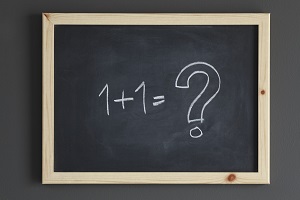Acalculia
 Acalculia is the inability to complete simple math problems.
Acalculia is the inability to complete simple math problems.
What Is Acalculia?
Many people struggle with math, but acalculia is much more than just difficulty with algebra or calculus. People with acalculia are unable to perform even basic math operations, such as identifying the greater of two numbers or adding two numbers together. Acalculia is an acquired condition, not one a person is born with, and can occur at any time.
What Are the Symptoms of Acalculia?
People vary somewhat in the degree to which they are affected by acalculia, but the primary symptom is the inability to complete or understand basic math operations. When a person has previously been able to perform these operations and has lost that ability, he/she may be experiencing acalculia. Screening tests often ask people to perform several different math operations, and may also attempt to rule out other conditions by testing spatial reasoning, verbal skills, and similar skills that can affect the ability to do math.
What Causes Acalculia?
Acalculia is usually caused by damage to areas of the brain directly related to mathematical reason, particularly the left parietal lobe of the angular gyrus. Blows to the head, brain injuries, and tumors can contribute to the development of acalculia. Acalculia is a symptom of a neurological condition called Gerstmann’s syndrome. Gertmann’s syndrome is rare, but can occur after a stroke or traumatic brain injury.
Is There Treatment for Acalculia?
There is no cure for either acalculia or Gerstmann’s syndrome. Instead, treatment focuses on occupational therapy and supportive care. Some people spontaneously recover from acalculia, and others notice that their symptoms diminish over time. However, some deficits typically remain for the rest of a person’s life.
References:
- Acalculia. (n.d.). Rice University. Retrieved from http://www.ruf.rice.edu/~lngbrain/Acalculia/acalculia.htm
- Basso, A., Caporali, A., & Faglioni, P. (2005). Spontaneous recovery from acalculia. Journal of the International Neuropsychological Society, 11(01). doi: 10.1017/S1355617705050113
- Gerstmann’s syndrome information sheet. (n.d.). National Institute of Neurological Disorders and Stroke. Retrieved from http://www.ninds.nih.gov/disorders/gerstmanns/gerstmanns.htm
Last Updated: 01-17-2018
- 2 comments
- Leave a Comment
Anthony F.
April 10th, 2019 at 2:40 AMThank you! I’ve had a stroke and it’s taken me two and a half years to realise this is actually a “thing” and then put a name to it. I used to be a bespoke cabinet maker (so was highly numerate) but now I have trouble counting bags of cement to mix a small batch of concrete. There’s lots of stuff about aphasia, but this is the first time I’ve even heard about acalculia (hahahaa, this is a page about it and it comes up as a spelling mistake). I shall keep this page open.
Julia J.
May 27th, 2019 at 1:18 PMI sm 43 years old abd suffered a stok onbocing day sfter a car accidrnt i unable to concentrate propetly on msthrmatical tasks. My fsniky thought it s big joke wgwn i said i coukd not dolve the problem or give them wrong answers to other solutiond
I did not like math before. Now its worse. I figured thst there was a special namw to rhis fondition and was elated wgen i found it. My hospital in Jamaica took toobling to start physiotherapy and any ithy work like this thst needs to be done in restoring normalcy.
Leave a Comment
By commenting you acknowledge acceptance of GoodTherapy.org's Terms and Conditions of Use.
